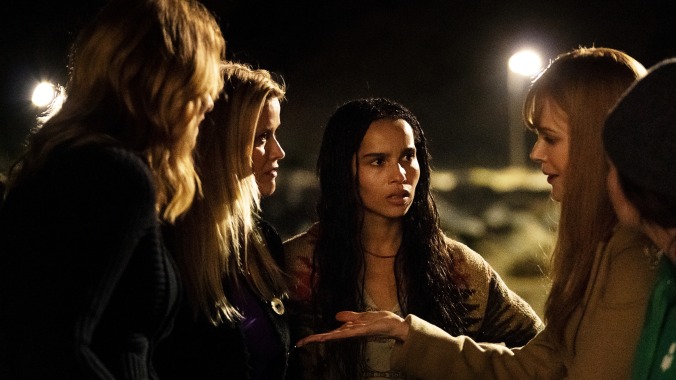But in practice, she’s just as thinly sketched as she is in the book. From the very first episode, Bonnie is positioned as an outsider. She’s married to Nathan (James Tupper), the ex-husband of de facto lead Madeline (Reese Witherspoon). Bonnie is the ultimate stereotype of the second wife—a cool, young, health-conscious yoga instructor. But her blackness complicates her characterization. Aside from her and her daughter, Skye, the only other black people in Monterey are a single dad and his daughter, who are rarely onscreen, and Detective Quinlan (Merrin Dungey), an equally scant presence. In the book, Madeline’s anger toward Bonnie is simple—she sees Bonnie as the kind of woman she could never be. Bonnie being black adds another, more uncomfortable layer to that, but the optics of Madeline constantly yelling at a black woman are never really addressed.
Madeline spends six episodes of the show’s seven-episode first season ranting angrily about Bonnie to any white person who will listen. Her words and actions foster hostility for Bonnie within the entire community. In most scenes where she appears, Bonnie is on the receiving end of undeserved anger. She’s also uncomfortably sexualized in a way that only increases her victimization. Meanwhile, a real monster is in their midst: Perry (Alexander Skarsgård). An actual threat to their community, Perry moves in silence, under the cover of the petty vendettas that drive most of the conflict. Once his identity is revealed, things quickly get out of hand. And then, in the midst of all the chaos, Bonnie saves the day. She pushes Perry, a rapist and abuser, to his death, effectively ending any lingering harm he could inflict on his wife, Celeste (Nicole Kidman), or his rape victim, Jane (Shailene Woodley). In one instant, Bonnie is able to solve the show’s most painful conflict despite knowing nothing about the situation. Her actions reveal Bonnie’s tremendous capacity for empathy, empathy that is almost never extended toward her onscreen or off.
This lack of empathy is exemplified perfectly in the second season’s sixth episode, “The Bad Mother.” With two cutting statements, Madeline becomes the mouthpiece for the show’s treatment of Bonnie: “Oh fuck off, Bonnie. I’m tired of taking care of you and your fucking feelings.”
These are perhaps the most maddening lines ever spoken on the show. Of all the women, Bonnie is the one who tries her best to empathize with everyone around her. It’s a credit to Kravitz’s performance that she’s able to give Bonnie pathos with her warm demeanor and thoughtful gaze. She quietly works to manage Madeline’s feelings and maintain the peace between their tenuously blended family. And then, after months of being treated like garbage, Bonnie instinctively steps up to protect the women around her without a second thought. She pushes Perry without knowing that he raped Jane, without knowing that he is Ziggy’s father, without knowing the extent of how much he hurt Celeste. She pushes Perry without knowing that his violence inspired his son, Max, to hurt Amabella (Ivy George), the daughter of working mom Renata (Laura Dern). Most horrifically, she pushes Perry without knowing Max also hurt her daughter, Skye (Chloe Coleman). We are told in dialogue that Max has pushed Skye down the stairs, but Bonnie never finds out. Bonnie never gets the opportunity to be in the group until she jeopardizes her life for them.
By the time season two begins, Bonnie is supposed to finally be in the inner circle. People refer to her, Madeline, Jane, Renata, and Celeste as the Monterey Five. The updated opening sequence ends with all five women walking on the beach in a straight line, exemplifying their unity. Yet once again, the opening deceives us. When the school year begins, Bonnie returns from a solitary summer in Montauk. Getting away for the season makes sense in context—Bonnie killed a man to protect women she barely knew, and then was forced to lie about what she did by the same women who spent the entire school year either yelling at her or avoiding her altogether. The lie that propels season two is a falsehood that is supposed to protect her. But Bonnie knows that when push comes to shove, these white women won’t stick up for her, as Madeline’s blow-up from episode six underlines.
Neglecting Bonnie is baked into the structure of the season. Seven episodes is a short time to get to know a character, and with the addition of Meryl Streep as Perry’s grieving mother, Mary Louise; Renata’s financial woes; and Madeline’s marital problems taking up every other scene, there was no space to give Bonnie’s story room to breathe. In lieu of strengthening her connections in Monterey, the show introduces Bonnie’s parents, Elizabeth (Crystal Fox) and Martin (Martin Donovan), further separating her from the rest of the cast. Bonnie’s interactions with her parents are cryptic, slowly dragging out aspects of their history that should have been at the forefront of the season.
Elizabeth’s presence does manage to provide insight into Bonnie’s disposition. It is revealed that she abused Bonnie while Martin stood by and let it happen. This explains how Bonnie was easily able to intuit that there was something wrong with Perry and Celeste and that she had to do something about it. But then, Elizabeth falls into a coma, robbing Bonnie of the kind of public confrontation afforded to the other women on the show. Bonnie’s conflict with her mother is addressed in private, in the form of a tearful monologue delivered to a comatose body. The monologue reveals that the push she gave to Perry was meant for Elizabeth. This is a reveal that deserved a public stage—the white women on Big Little Lies are afforded the freedom to melt down in public, but not Bonnie.
With more empathetic writing, Bonnie could have been the emotional anchor of season two. That role belonged to Jane in season one, as the residents of Monterey slowly got to know her, empathize with her trauma, and accept her into the fold. That could have easily happened for Bonnie, if only the writing allowed it. Like Jane, Bonnie’s history of trauma could have been a bridge to bonding with Celeste. Bonnie could have called out Madeline for her bullying, the way Jane calls out Renata near the end of season one. These confrontations are rites of passage for the Monterey Five, cementing them as a strong unit of friends who accept each other. But Bonnie is never truly accepted: No one gets to know her, no one learns about the inner workings of her marriage to Nathan. No one knows what kind of kid Skye is. All that we know is that everyone either treats her badly or ignores her altogether. The problem with Bonnie being surrounded by white people who aren’t interested in getting to know her is that we as an audience don’t get to know her either.


